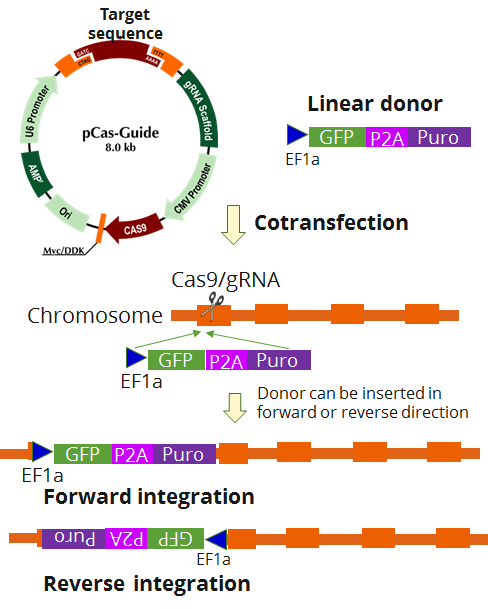IL4 Human Gene Knockout Kit (CRISPR)
CAT#: KN409972
IL4 - KN2.0, Human gene knockout kit via CRISPR, non-homology mediated.
KN2.0 knockout kit validation
KN409972 is the updated version of KN209972.
USD 1,290.00
2 Weeks*
Size
Other products for "IL4"
Specifications
| Product Data | |
| Format | 2 gRNA vectors, 1 linear donor |
| Donor DNA | EF1a-GFP-P2A-Puro |
| Symbol | IL4 |
| Locus ID | 3565 |
| Disclaimer | The kit is designed based on the best knowledge of CRISPR technology. The system has been functionally validated for knocking-in the cassette downstream the native promoter. The efficiency of the knock-out varies due to the nature of the biology and the complexity of the experimental process. |
| Reference Data | |
| RefSeq | NM_000589, NM_172348, NM_001354990 |
| Synonyms | BCGF-1; BCGF1; BSF-1; BSF1; IL-4 |
| Summary | 'The protein encoded by this gene is a pleiotropic cytokine produced by activated T cells. This cytokine is a ligand for interleukin 4 receptor. The interleukin 4 receptor also binds to IL13, which may contribute to many overlapping functions of this cytokine and IL13. STAT6, a signal transducer and activator of transcription, has been shown to play a central role in mediating the immune regulatory signal of this cytokine. This gene, IL3, IL5, IL13, and CSF2 form a cytokine gene cluster on chromosome 5q, with this gene particularly close to IL13. This gene, IL13 and IL5 are found to be regulated coordinately by several long-range regulatory elements in an over 120 kilobase range on the chromosome. IL4 is considered an important cytokine for tissue repair, counterbalancing the effects of proinflammatory type 1 cytokines, however, it also promotes allergic airway inflammation. Moreover, IL-4, a type 2 cytokine, mediates and regulates a variety of human host responses such as allergic, anti-parasitic, wound healing, and acute inflammation. This cytokine has been reported to promote resolution of neutrophil-mediated acute lung injury. In an allergic response, IL-4 has an essential role in the production of allergen-specific immunoglobin (Ig) E. This pro-inflammatory cytokine has been observed to be increased in COVID-19 (Coronavirus disease 2019) patients, but is not necessarily associated with severe COVID-19 pathology. Two alternatively spliced transcript variants of this gene encoding distinct isoforms have been reported. [provided by RefSeq, Aug 2020]' |
Documents
| Product Manuals |
| FAQs |
Resources
Other Versions
| SKU | Description | Size | Price |
|---|---|---|---|
| GA102382 | IL4 CRISPRa kit - CRISPR gene activation of human interleukin 4 |
USD 1,290.00 |
{0} Product Review(s)
0 Product Review(s)
Submit review
Be the first one to submit a review
Product Citations
*Delivery time may vary from web posted schedule. Occasional delays may occur due to unforeseen
complexities in the preparation of your product. International customers may expect an additional 1-2 weeks
in shipping.






























































































































































































































































 Germany
Germany
 Japan
Japan
 United Kingdom
United Kingdom
 China
China

